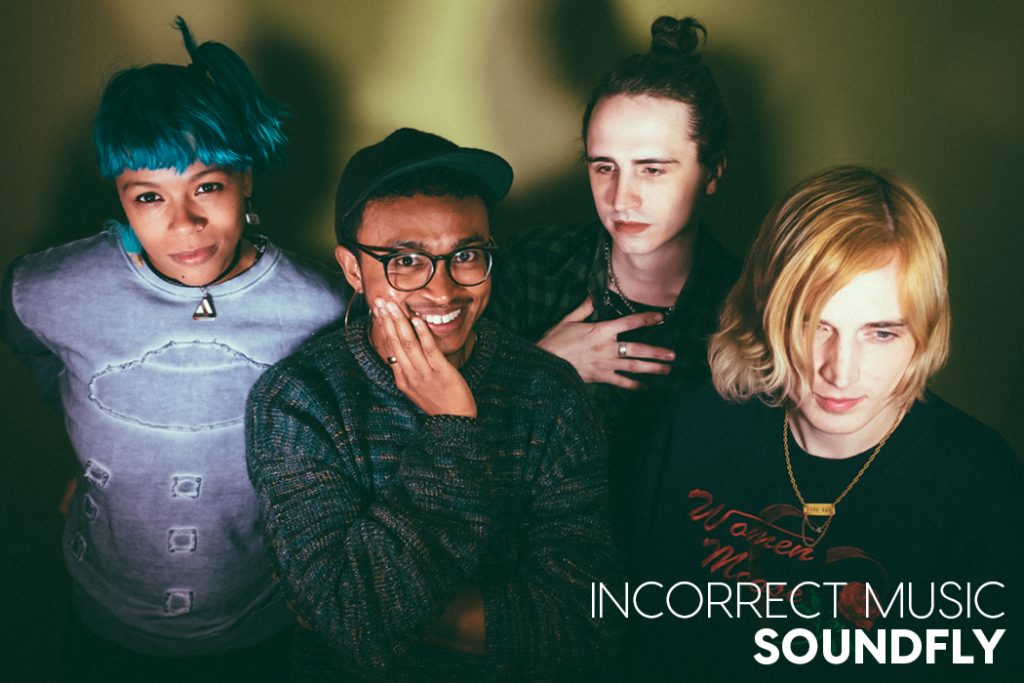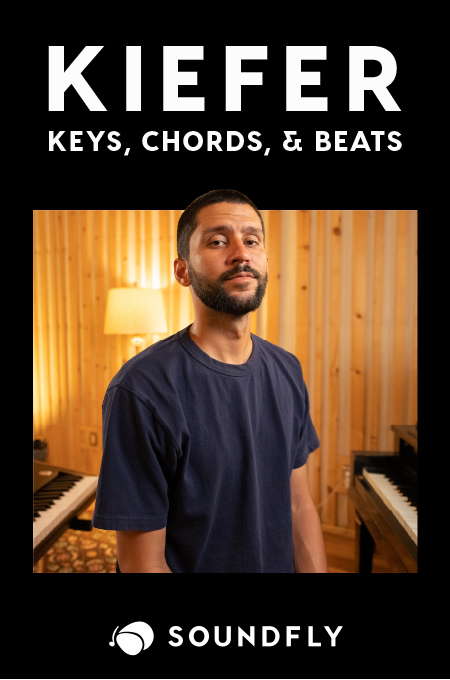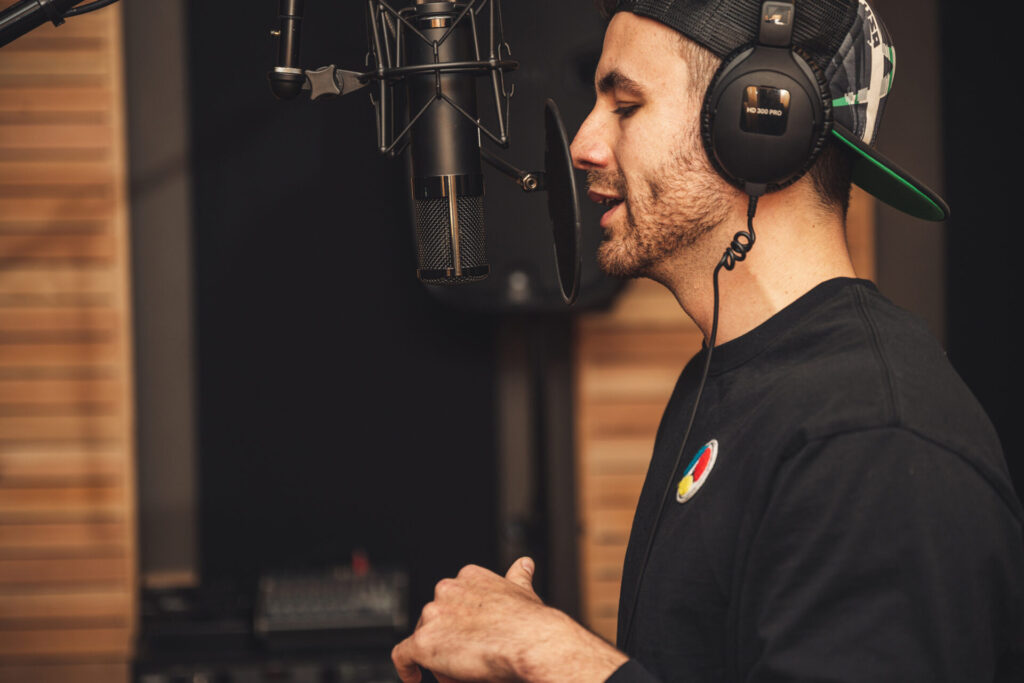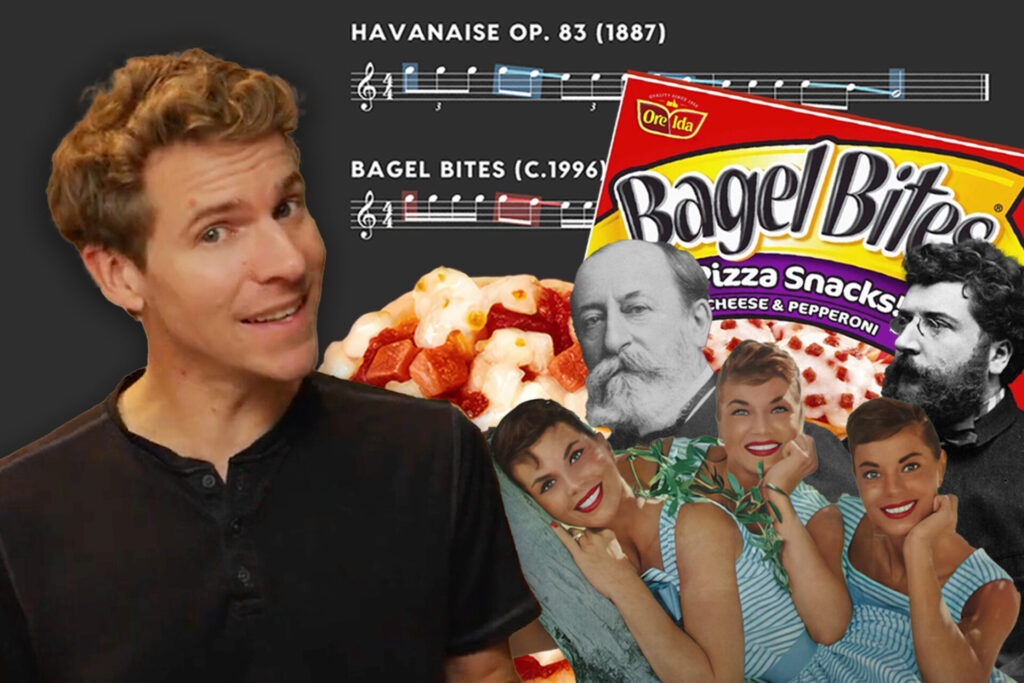Welcome back to Soundfly’s weekly interview series, Incorrect Music, curated by guitarist, singer, and composer Lora-Faye Åshuvud (of the band Arthur Moon). In this series, we present intimate conversations with artists who are striving to push the boundaries of their process and craft.
“Our songs are just a little more intricate than the typical picture that comes to mind when you hear the words ‘punk band,’” says Mars Dixon, a founding member and one of the two guitarists and vocalists in Brooklyn’s four-piece Aye Nako, whose idiosyncratic punk levels genre expectations from the get-go.
The band’s recent full-length, Silver Haze, reflects the experiences of its black, queer, and trans members, which Mars volunteers as one of the “incorrect” elements about Aye Nako when asked by our interviewer Evan Zwisler: “Rock music being made by a group of black and trans people. It’s just not really a thing… yet.” Aye Nako is definitely a thing — a really good, dissonant, vivid, devastating thing.
Aye Nako’s recent album, Silver Haze, is out now via Don Giovanni Records.
– Lora-Faye Åshuvud
Interview by Evan Zwisler
I hear lots of Jawbreaker and the Pixies in your music. Did they help influence your sound, and who are some of your other influences?
Mars: The Pixies, for sure, but also Sonic Youth, Juliana Hatfield, Helium, Superchunk, Built to Spill, Modest Mouse, Nirvana, Thingy, Swirlies, Spinanes, and Speedy Ortiz as far as my personal influences go.
You have gone on tour with some amazing bands like Joanna Gruesome and Speedy Ortiz. What was one of the most memorable shows you played on the road?
The first show that comes to mind is one we played at the Drunken Unicorn in Atlanta. The others in my band have this running prank where they scare me with a rubber spider by placing it literally everywhere. It started on the Joanna Gruesome tour two or three years ago. I’d find it on the toilet paper in the bathroom, in my sleeping bag, in the glove compartment, someone would ask me to get their wallet out of their backpack for them, and the damn spider would be in there!
At this show, we had finished one song, and I look down to make some adjustments to a pedal. The spider was there on my pedal board! I still don’t know how, but I think Joanna Gruesome was in on it. I asked for a little less spider in my monitor and explained how my bandmates kept pranking me.
Later, during a chaotic breakdown in JG’s closer, they handed us their instruments. Jade [Payne, guitarist/singer in Aye Nako] was rolling on the floor with a guitar, and I was offstage banging away on another guitar. I felt like our bands were really bonding that night. It doesn’t happen quite enough, but after the show, I met a handful of nice queer and trans showgoers. It meant a lot to me that they were there.
Sound-wise, you describe yourself as “a punk band, but not necessarily of the power-chord-playing variety.” Can you talk about this a bit more?
I almost never play a three-string power chord. I’ll do a lot of two-string octaves and other positions. I guess the need for that clarifier comes from a place of insecurity. Our songs are just a little more intricate than the typical picture that comes to mind when you hear the word “punk band.”
And message-wise, you describe yourself as a “queer punk” band. Do you feel that you’re a band that sings about queer issues and represents the queer community or are you a band whose members happen to be queer?
We just happen to be queer. All our songs are written with a queer lens even if we’re not singing explicitly about “queer issues.”
Do you explicitly sing about queerness or does it simply permeate your music because that’s who you are?
I think our queerness is something that drew us together, but heartbreak might be the true foundation of Aye Nako. That is the running theme through all of our songs.
“You don’t need to already know how to play an instrument to be in a band. Form bands with women!”
You self-released your first EP, and now you’re a part of Don Giovanni Records. How did you find yourself on their record label? Also, what are some of the benefits and drawbacks of singing to a label?
Joe Steinhardt, who runs Don Giovanni, is old friends with our original drummer. He actually asked us about joining DG ages ago, but we were adamant about self-releasing that first record. I’m grateful for not having to front the money for the records or recording! But that means we have to buy them from the label later.
How did the space and equipment at Room 17 help shape your album, Silver Haze? Did its large recording room encourage you to record the whole band at once?
We recorded all at once but in separate rooms. The drums in the main room, guitars in individual booths and bass in the kitchen. There were a bunch of pedals and keyboards there that we used. The key thing that helped shaped the album was watching on the projector in the control room, old live videos of Smashing Pumpkins, Zombeavers, The Truman Show, and a handful of other movies, and silver haze…
What was your favorite piece of equipment you used during this recording? Did you find anything at the studio that became a big part of the sound on the album?
I used a Rat pedal to spice up the texture of my vocals a little bit. I think my favorite thing would be the anchor chain that Sheena [McGrath], our drummer, used for one song. It’s buried in the recording, but she was slamming it down from above her head onto the concrete floor. Watching her do that from the control room was pretty priceless.
What was your relationship with your producer, Joe Rogers, like? Did he help style the music in any sort of way?
He was a big part of it! He helped us get the sounds and tones we wanted. Any parts we’d written or recorded and we were unsure of, he’d tell us what sounded best. He helped us put out our best performances of the songs. It felt less stressful and more comfortable, like we were just hanging out.
What about your music might you consider to be “incorrect”?
Rock music being made by a group of black and trans people. It’s just not really a thing… yet.
Do you have a piece of advice for amateur artists looking to up their game?
You don’t need to already know how to play an instrument to be in a band. Form bands with women!
Want to get all of Soundfly’s premium online courses for a low monthly cost?
Subscribe to get unlimited access to all of our course content, an invitation to join our members-only Slack community forum, exclusive perks from partner brands, and massive discounts on personalized mentor sessions for guided learning. Learn what you want, whenever you want, with total freedom.





